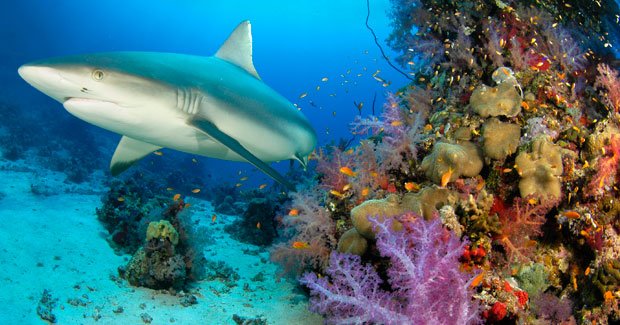New shark repellents under development

RESEARCH INTO THE FUNCTIONING of shark brains may lead to new repellent technology which will help prevent the animals being killed in commercial fishing operations.
“By examining the sensory input to the brains of sharks, we hope to eventually develop ways to repel sharks from fishing gear and being needlessly killed. They occupy a vital part of our ecosystem,” says project leader Professor Shaun Collin from the University of Western Australia in Perth.
Experts estimate that around 15 million sharks and stingrays are caught globally each year. Though many of these animals are directly targeted, a large number are accidentally caught as bycatch by indiscriminate fishing methods. To compound the problem of sharks being killed by commercial fishing operations, many also develop at a slow rate.
Sharks are slow growers
“They become sexually mature at a relatively old age, and have few offspring; therefore it takes a long time for a population to recover from losses,” says marine biologist Bill Gladstone from the University of Technology Sydney. “Their populations are vulnerable to heavy losses of adults – such as through excessive capture and bycatch. Reducing bycatch is therefore a very important management goal,” he says.
Shaun’s team is developing a system of deterring sharks from nets and on longlines by disturbing their electroreception sense, which they use to detect small electric fields in the water. There are currently no effective shark repellent technologies.
“Realistically, in two to three years time we may have some deterrents if the research can be fully funded,” he says. “Electropositive metals are being developed in Florida at the moment. Sharks react negatively to these metals, and when used in conjunction with fishing gear such as netting or longlines it is expected it will prove to be the most successful deterrent.”
Shaun was a co-author on a new study of the brain structure of sharks published in the journal the Proceedings of the National Academy of Sciences earlier this month.
Beach protection from sharks
His team are also looking at repellents based on smell, taste and sound. To this end, they are testing natural substances which could be applied to fishing gear. “The olfactory bulbs process odours dissolved in the water,” says Shaun. “Smell is a very important sense for sharks and appears to drive many feeding behaviours.”
“However, little is known about sharks’ hearing, so more research needs to be done on their auditory system,” Shaun told Australian Geographic.
Marine biologist Dr John Stevens with the CSIRO in Hobart, Tasmania, agrees that “you might be able to train sharks to avoid a fixed net installation that always remained in the same place. However, fishing gear is mobile and has infinite variations so that would be a totally different task.”
Shaun says that the repellent technology could also find a use in shark nets which are used in many parts of Australia to keep the animals away from beaches popular with swimmers and surfers.
RELATED STORIES

